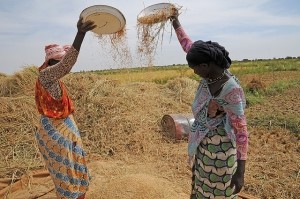
Ministers for Gender and Women Affairs of ECOWAS Member States have resolved to ensure that the gender component is adequately taken into account in the implementation of the ECOWAS Zero Hunger initiative.
The Ministers made this commitment in New York in a Communiqué adopted at the official launch of a Technical Cooperation programme between ECOWAS and FAO on “national and regional agricultural investment plans for the Zero Hunger initiative in ECOWAS Member States”.
The ECOWAS Commissioner for Social Affairs and Gender, Mrs Fatimata Dia Sow hoped the initiative would help actuate the people’s aspirations set out in ECOWAS Vision 2020, which seeks to “create a borderless, peaceful and cohesive region built on good governance, where the people have the capacity to access and harness their enormous resources through the creation of opportunities for sustainable development and environmental preservation”.
In the Final Communiqué, the Ministers reaffirmed their commitment to work with key partners, including the ministries of Agriculture, Environment, Economic Planning and Finance, United Nations agencies, Civil Society organizations, the Private Sector, media houses and the international community, on advocacy for the inclusion of gender in the implementation and monitoring of the Regional Partnership Pact for the implementation of the ECOWAS Common Agricultural Policy by 2015 (ECOWAP/CAADP 2025).
They also stated their determination to promote the capacity building of ECOWAS Commission and Government institutions, to increase the options offered to women for inclusive agricultural growth and processing in the ECOWAS region. This includes the preparation, funding, implementation and monitoring of inclusive and gender-sensitive agricultural policies and programmes.
Improving food security and nutrition
In a statement delivered on behalf of Mr. Bukar Tijani, Assistant Director-General and FAO regional representative, Ms Carla Mucavi, Director of the FAO liaison office at the United Nations Organization, stated that FAO recognizes the central role of gender equality and women empowerment in its mandate to ensure food security for all by increasing nutrition levels, enhancing agricultural productivity and natural resource management and improving the living conditions of rural people.
“Our gender equality policy adopted in 2012 aims to advance equal voice, agency, and access to resources and services among men and women in sustainable agricultural development and rural development” she said.
“The gender initiative is extremely timely as it affords the opportunity to put into practice the gender-responsive budgeting in the implementation of ECOWAP and the ECOWAS Regional Agricultural Policy. It will also enhance outcomes in the area of gender equality in the implementation of the ECOWAS Zero Hunger initiative and the Regional Agriculture Investment Plan, while leading to the formulation of an ECOWAS Action Plan on gender and agriculture”, Ms Mucavi added.
Accelerating Economic Empowerment
The Principal Officer responsible for gender matters at the FAO regional office, Mrs Tacko Ndiaye noted that the FAO had boosted the implementation of its gender equality policy for an egalitarian world where men and women, including young men and women, will be equally empowered in the entire agricultural value chain using multifarious approaches.
These approaches include the promotion of equal access for women to land, funding, services and skills development, support for gender equitable strategies for poverty reduction, capacity building for women management in rural institutions and farmer organizations, as well as the promotion of their access to decent rural employment and social welfare.
« The lessons learnt are a source of inspiration in the implementation of this technical cooperation project with the ECOWAS Commission while building on other ongoing initiatives by the FAO in ECOWAS Member States » she stated.
FAO is currently implementing projects geared towards women’s economic empowerment, such as the “Enable women to benefit more equitably from agri-food value chains” project which covers eight African countries including Burkina Faso, Cote d’Ivoire and Ghana. The focus of the project is fish processing and the development of the cassava value chain.
Joint programmes with UN agencies have focused on the “acceleration of the economic empowerment of rural women” in Liberia, and Niger and the “acceleration of progress towards the economic empowerment of rural women in Niger and Liberia”.
Other viewpoints
Mrs Euphrasie Kouassi Yao, Ivorian Minister for Women, Family and Child Protection: “we commend this project which opens up good prospects for sustainable agriculture, food security and the Zero Hunger initiative”.
Mrs Bineta Diop, African Union Commission Special Envoy on Women, Peace and Security: “the collaboration between FAO and ECOWAS can contributeto poverty reduction and the attainment of the Zero Hunger goal”.
|




